- Home
- Elizabeth George
Believing the Lie il-17 Page 6
Believing the Lie il-17 Read online
Page 6
Twins had been fashioned from three of the few remaining town houses in the area not razed by someone’s idea of redevelopment in the nineteenth century. It was marked only by a discreet bronze plaque to the right of the doorbell and by an azure flag with the eponymous founders of the club memorialised upon it. They’d been conjoined, or so at least it seemed by their depiction on the flag. As far as Lynley knew, no one had delved deeply enough into the history of the place to learn whether this was an apocryphal account of the club’s genesis.
He was admitted not by a doorman but rather by an elderly woman in black with a crisp white pinafore apron pinned to her chest. She looked like someone from another century and, as things developed, she moved like that as well. He stated his business in an entry hung with Victorian paintings of uncertain quality that loomed above a marble draughtsboard floor. The woman nodded and negotiated something like a three-point turn before leading him to a door to the right of an impressive staircase broken by a mezzanine. There a sculpture of Venus on the half shell stood, backed by a window that arched to display the upper part of a garden, evidenced by the remains of a tree strangled by ivy.
The woman knocked, opened, and admitted him into a darkly panelled dining room, closing the door behind him. The room was empty of diners at this hour but occupied by two men at one of the linen-covered tables. They had a porcelain coffee service between them. There were three cups.
One of the men was the assistant commissioner, and the other was a bespectacled bloke who was, perhaps, too well-dressed for the time of day and the present environment, although, for that matter, so was Hillier. They seemed of an age but unlike Hillier, the other man had a receding hairline that he emphasised rather than hid, by combing his remaining locks straight back, where they lay flat against his skull in defiance of fashion and looks. His hair was uniform in colour — mousy brown would have best described it — and thus seemed to be dyed. Also in defiance of fashion, his spectacles were thick rimmed with enormous black frames, and these in combination with an astoundingly overlarge upper lip unmatched to his lower made him look like someone begging to be caricatured. This, in fact, suggested to Lynley that he knew of the man, although he couldn’t have stated his name.
Hillier did that. “Lord Fairclough,” he said. “Bernard, this is DI Lynley.”
Fairclough stood. He was far shorter than both Lynley and Hillier, perhaps five feet five inches, and he carried something of a gut on him. His handshake was firm, and during the ensuing meeting, nothing he said or did indicated that he was anything but strong willed and confident.
“David’s told me about you,” Fairclough said. “I hope we can work well together.” His accent placed him from the north and its nature surprised Lynley, for it spoke of an education decidedly not undergone in a hallowed public school. He glanced at Hillier. It was completely like the AC to rub elbows with someone in possession of a title. It was completely unlike the AC, on the other hand, to do this elbow-rubbing with someone whose title had come not via the blood but rather, like his, via the Honours List.
“Lord Fairclough and I were knighted on the same day,” Hillier said, as if he felt an explanation for their association was required. He added, “Fairclough Industries,” as a means of clarification, as if the name of Fairclough’s source of wealth — if he had any — would be apparent at once.
“Ah,” Lynley said.
Fairclough smiled. “The Fairloo,” he said as means of clarification.
That did it, of course, as it would do. Bernard Fairclough had come to prominence first because of a most unusual lavatory invented and then widely produced by Fairclough Industries. He’d sealed his place in the firmament of those receiving titles from a grateful nation, however, by establishing a charitable foundation whose focus was raising funds to research a cure for pancreatic cancer. However, Fairclough had never been able to escape his association with the lavatory, and much amusement had been generated by tabloids referring to his knighthood and subsequent elevation to the peerage with such declarations as “It was a royal flush.”
Hillier gestured at the table. Lynley was meant to join them. Without asking, Hillier poured him a cup of coffee and, as Lynley sat and Fairclough resumed his own place at the table, slid the cup in his direction along with the milk and sugar.
“Bernard’s asked a favour of us,” Hillier said. “It’s an entirely confidential matter.”
Which explained their meeting at Twins, Lynley thought. Which also explained their meeting at Twins at a time of day when the only members in the building were probably either dozing over newspapers in the library or playing squash in a basement gym. Lynley nodded but said nothing. He glanced at Fairclough, who removed a white handkerchief from his pocket and patted it against his forehead. This bore a moderate sheen of sweat. It was not overly warm in the room.
He said, “My nephew — Ian Cresswell, my late sister’s son — drowned ten days ago. South end of Lake Windermere sometime after seven in the evening. His body wasn’t found till the next afternoon. My wife was the one who found him.”
“I’m sorry to hear it.” It was, of course, an automatic response to being given such information. Hearing it, Fairclough’s face remained a blank.
“Valerie likes to fish,” he told Lynley, a remark that sounded apropos of nothing till he went on with, “She takes a small rowingboat out a few times each week. Odd hobby for a woman but there it is. She’s fished for years. We keep the boat along with several other craft in a boathouse on the property, and that’s where Ian’s body was. Facedown in the water, open gash on his head, although at that point there was no blood.”
“What seems to have happened?”
“Lost his footing getting out of a single scull. It’s how he took his exercise, that, the scull. He went down, hit his head on the dock — it’s stone — and fell into the water.”
“Couldn’t swim or unconscious?”
“The latter. A terrible accident, according to the inquest.”
“You think otherwise?”
Fairclough turned in his seat. He seemed to look at a painting over a fireplace at the far side of the room. This was a circus scene painted in the style of Hogarth: part of the rake’s progress, with assorted human oddities from the circus in place of the rake. It was another vote for the conjoined twins. They’d have been circus material, certainly. Fairclough studied the scene depicted before he finally said, “He fell because two large stones came loose on the dock. They dislodged.”
“I see.”
Hillier said, “Bernard thinks there’s a chance the stones had some help, Tommy. The boathouse has stood for more than one hundred years and it was built to stand a hundred more. So was the dock.”
“Yet if the coroner has ruled an accident — ”
“I don’t actually disbelieve him,” Fairclough said quickly. “But …” He looked at Hillier as if asking the AC to finish.
Hillier complied. “Bernard wants to be certain it was an accident, as anyone might. There are family concerns.”
“What sort of family concerns?”
The other men were silent. Lynley looked from one to the other. He said, “I can hardly make certain of anything if I’m in the dark, Lord Fairclough.”
“It’s Bernard,” Fairclough said, although Hillier’s look in his direction suggested that such familiarity was going to breed the usual. “It’s Bernie, actually, among the family. But Bernard will do.” Fairclough reached for his coffee cup. Hillier had topped it up, but it seemed that Fairclough wanted the cup more for something to do with his hands than for drinking. He turned it, examined it, and finally said, “I want to be certain that my son Nicholas wasn’t involved in Ian’s death.”
Lynley let a moment hang while he absorbed this information and what it could imply about the father, the son, and the deceased nephew. He said, “Have you reason to believe Nicholas might be involved?”
“No.”
“Then?”
Again that glance
towards Hillier, which prompted the AC to say, “Nicholas has had a… We’d have to call it a troubled youth. He seems to have got over it, but as he’s seemed to get over it before, Bernard’s fear is that the boy — ”
“A man now,” Fairclough cut in. “He’s thirty-two. He’s married as well. When I look at him, things seem to have changed. He seems to have changed, but it was drugs, all sorts but particularly methamphetamine, and it went on for years, you see, since he was round thirteen. He’s lucky even to be alive at this point, and he swears he knows it. But that’s what he always said, isn’t it, time after time.”
Lynley heard all this with a dawning of understanding as to how he fitted into what was going on. He’d never spoken of his brother to Hillier, but Hillier had snouts in every part of the Met and how unlikely was it that among the information he gathered was that which told the AC of Peter Lynley’s battles with addiction?
Bernard continued. “Then he met a woman from Argentina. She’s a real beauty, and he fell in love, but she laid down the law. She’d have nothing to do with him till he got the monkey off his back permanently. So he did so. Apparently.”
To Lynley this seemed all the more reason that Nicholas Fairclough was uninvolved, but he waited for more and it came in fits and starts. It seemed that the dead man had grown up in the Fairclough home, playing the role of an older brother whose perfection had created footsteps too large for the younger Nicholas ever to hope he’d be able to walk in. Ian Cresswell had successfully completed schooling at St. Bees in Cumbria, and from there achieved further success at university. This put him in position to serve as the chief of finances for Fairclough Industries as well as the man in charge of Bernard Fairclough’s personal financial affairs. These affairs, it seemed, were considerable.
“No decision’s been made as to who’ll take over the daily running of the firm when I’m no longer around,” Fairclough said. “But obviously, Ian was very high on the list of contenders.”
“Did Nicholas know this?”
“Everyone knew it.”
“Does he stand to gain, then, from Ian’s death?”
“As I’ve said, no decision had — or has — been made.”
So if everyone knew where Ian stood, everyone — whoever everyone was — had a motive for murder, Lynley thought, if murder it was. Yet if the coroner had deemed it an accident, Fairclough should have been relieved, which he clearly was not. Lynley wondered idly if, despite his words, Fairclough in fact wanted his son to be the cause of his own cousin’s death. It was perverse, but in his time at the Met, Lynley had seen his share of perversity.
“Exactly who is everyone?” Lynley enquired. “I take it there are others besides Nicholas with a vested interest in Fairclough Industries?”
There were, as it turned out: There were two older sisters and a former son-in-law, but it was Nicholas about whom Fairclough had concerns. Lynley could leave the rest of them alone. Not a single one of them was a killer. They lacked the bottle for it. Nicholas, it seemed, did not. And besides, with his history… One wished to be sure he had no involvement in this matter. One merely wished to be sure.
“I’d like you to take this on,” Hillier told Lynley. “You’ll have to go up to the Lakes and all of it has to be done with complete discretion.”
A police investigation managed with complete discretion, Lynley thought. He wondered how he was meant to accomplish that.
Hillier elucidated. “No one will know you’ve gone there. And the local police won’t know you’re doing this. We don’t want to give the impression that the IPCC’s about to get involved. No feathers ruffled but no stone unturned. You know how to manage that.”
The fact was that he didn’t. And there was something else that made him uneasy. He said, “Superintendent Ardery is going to want to — ”
“I’ll handle Superintendent Ardery. I’ll handle everyone.”
“So I’m to work on this completely alone?”
“No one at the Yard can be involved,” Hillier said.
This seemed to be code for the fact that Lynley was meant to do nothing at all if Nicholas Fairclough turned out to be a killer. He was to leave him to the hands of his father, to the hands of God, or to the hands of the Furies. All of this amounted to an investigation Lynley wanted no part of. But he knew he wasn’t being requested to make a trip up to Cumbria. He was being told to do so.
FLEET STREET
THE CITY OF LONDON
Rodney Aronson had clawed his way to his present position as editor of The Source through means both fair and foul, and one of those means was the cultivation of an impressive collection of snouts. He was where he wanted to be in his life, which was sitting in an impressive if somewhat chaotic office where he could wield absolute power, but this did not prevent him from feeling grievances. He hated arrogance. He hated hypocrisy. He hated stupidity. But most of all, he hated incompetence.
Following a story was not rocket science. Neither was chivvying it along. Following merely required three things: research, shoe leather, and doggedness. Chivvying required a willingness to see one’s fellow humans squirm and, if necessary, be squashed. If this latter requirement itself required a bit of slithering on the part of the reporter, what of it? The end product was the story and if the story was big enough with an appropriate amount of sensation attached to it, big sales were the result. Big sales translated into increased advertising, which translated into increased revenue, which translated into orgasmic delight from The Source’s chairman, the cadaverous Peter Ogilvie. At all costs, Ogilvie needed to be kept well oiled with good news in the form of profits. As to whose head or reputation rolled in pursuit of these, it mattered not.
Granted, the story of Nicholas Fairclough’s putative redemption from the clutches of drugs had been a snore of monumental proportions. They could have used it in operating theatres in place of anaesthetic, such a soporific had it been. Now, however, things were looking up. Now, it seemed, Rodney might not have to defend the expenditure of Zed Benjamin’s initial trip to Cumbria to develop the story, no matter the incredible cost the reporter had incurred.
But that thought brought forward the whole issue of journalistic stupidity. Rodney could not see how idiot Benjamin could have failed yet a second time to nose his way into a story when the damn smell of it was right in front of him. Another five days tramping round Cumbria had resulted in nothing but an extension of the tedious panegyric he’d already created about Nicholas Fairclough, his doped-up past, his reformed present, and his doubtless sanctified future. Other than that, there was nada to interest the typical Source reader. There was zero, nought, and double nought with nuts.
Receiving the news from a head-hanging Benjamin that there was nothing more he could possibly add to what he’d written, Rodney knew he should kick the bloke out on his ear. He couldn’t explain to himself why he hadn’t done so, and he thought at first he might be getting soft. But then one of his snouts phoned in, passed along a delectable tip, and Rodney reckoned he might not have to sack Benjamin after all.
What the snout had to say constituted an instructive moment, and since Rodney Aronson loved instructive moments nearly as much as he loved anything containing cacao, he sent for the red-haired giant and enjoyed a Kit Kat that he washed down with an espresso from his personal machine, this latter a gift from Butterball Betsy, a wife who knew many ways to please. That most of them were gustatory didn’t bother him.
Rodney had finished the Kit Kat and was making himself a second espresso when Zed Benjamin lumbered into the room. Damn if he still wasn’t wearing the beanie, Rodney thought with a sigh. He had little doubt that the dumbo had yarmulked his way round Cumbria a second time, successfully putting everyone off yet again. Rodney shook his head in resignation. The folly he had to endure as editor of The Source sometimes truly offset its delights. He decided not to mention the headgear again. He’d done so once, and if Benjamin wouldn’t take his advice, there was nothing for it but to let him sink under the weight o
f his own nonsensical inclinations. He’d learn or he wouldn’t, and Rodney knew which alternative was more likely. End of story.
“Shut the door,” he said to the reporter. “Take a seat. Give me a second here.” He admired the creamy nature of his concoction and turned off the machine. He carried his drink to the desk and sat. “Death is sex,” he said. “I reckoned you’d work that out for yourself, but it seems you can’t. Got to tell you, Zedekiah, this line of work might not be for you.”
Zed looked at him. He looked at the wall. He looked at the floor. He finally said, “Death is sex,” so slowly that Rodney wondered if the man’s brains had gone the way of his footwear because for some reason he was wearing not respectable shoes but instead very odd-looking sandals with tire treads for soles, along with striped socks that appeared to be handmade from remnants of yarn.
“I told you the story needed sex. You went up there a second time and tried to find it. That you failed to find it I can understand, more or less. But what I can’t understand is how you failed to see the moment of potential rescue when it came. You should’ve been in here like a flash yelling eureka or cowabunga or praise Jesus, I’m saved. Well, probably not that last, all things considered, but the point is you got handed a way into the story — and this would be a way to save it and to justify the expense the paper went to in sending you up there in the first place — and you missed it. Completely. The fact that I had to discover it myself concerns me, Zed. It really does.”
“She still wouldn’t talk to me, Rodney. I mean, she talked but she didn’t talk. She says she’s not what’s important. She’s his wife, they met, they fell in love, they married, they came back to England, and there’s an end to her part of the tale. From what I can tell, she’s entirely devoted to him. But everything he’s done, he’s done himself. She did tell me that it would benefit him — encourage was the word she used — if the story featured his recovery alone and not her part in it. She said something like, ‘You need to understand how important it is for Nicholas to be acknowledged as having achieved this on his own.’ She meant his recovery. I did get that the reason for her wanting the recognition to go to him has to do with his relationship with his dad, and I shaded the story that way, but there didn’t seem to be anything more — ”

 Well-Schooled in Murder
Well-Schooled in Murder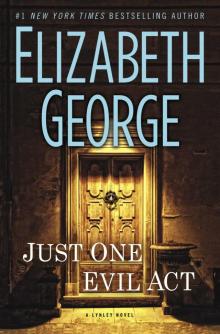 Just One Evil Act
Just One Evil Act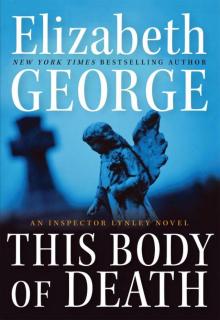 This Body of Death
This Body of Death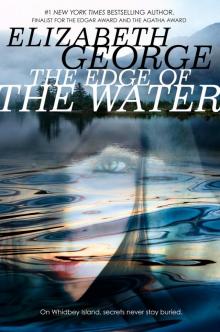 The Edge of the Water
The Edge of the Water For the Sake of Elena
For the Sake of Elena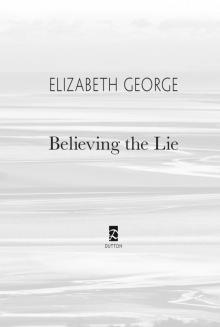 Believing the Lie
Believing the Lie The Edge of the Shadows
The Edge of the Shadows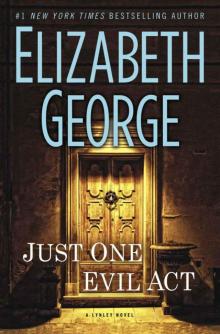 Just One Evil Act: A Lynley Novel
Just One Evil Act: A Lynley Novel In Pursuit of the Proper Sinner
In Pursuit of the Proper Sinner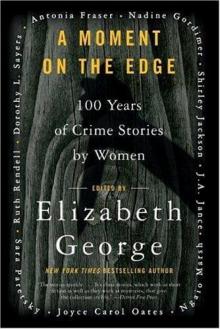 A Moment on the Edge:100 Years of Crime Stories by women
A Moment on the Edge:100 Years of Crime Stories by women Elizabeth I
Elizabeth I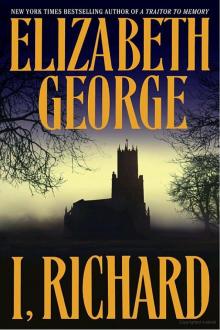 I, Richard
I, Richard A Traitor to Memory
A Traitor to Memory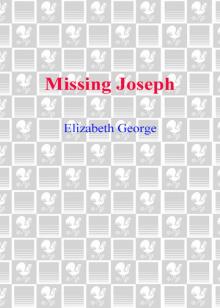 Missing Joseph
Missing Joseph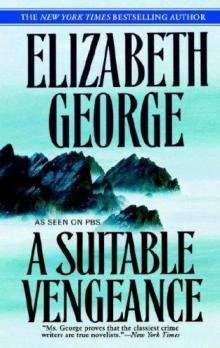 A Suitable Vengeance
A Suitable Vengeance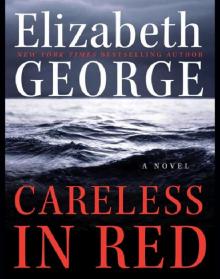 Careless in Red
Careless in Red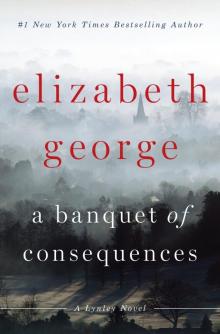 A Banquet of Consequences
A Banquet of Consequences Playing for the Ashes
Playing for the Ashes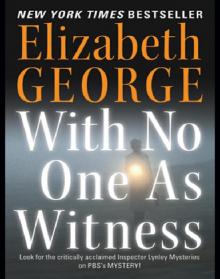 With No One As Witness
With No One As Witness Deception on His Mind
Deception on His Mind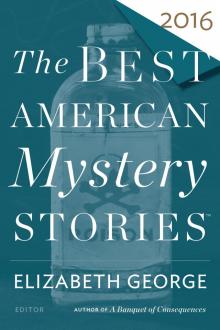 The Best American Mystery Stories 2016
The Best American Mystery Stories 2016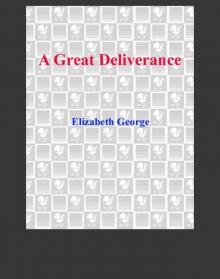 A Great Deliverance
A Great Deliverance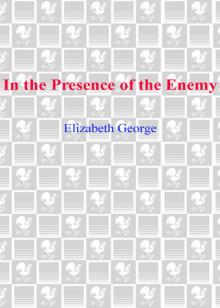 In the Presence of the Enemy
In the Presence of the Enemy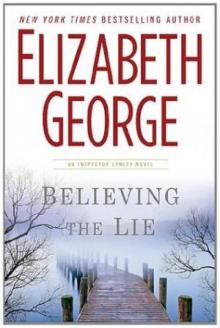 Believing the Lie il-17
Believing the Lie il-17 The Edge of the Light
The Edge of the Light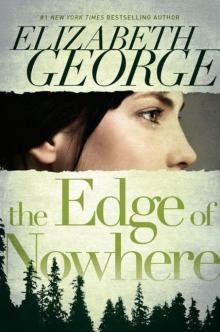 SW01 - The Edge of Nowhere
SW01 - The Edge of Nowhere A Place of Hiding
A Place of Hiding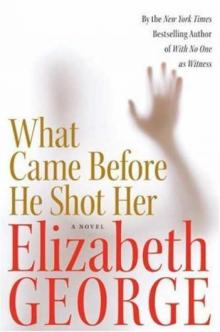 What Came Before He Shot Her il-14
What Came Before He Shot Her il-14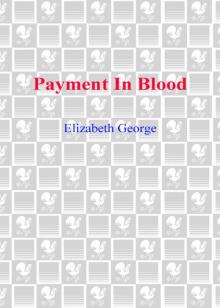 Payment In Blood
Payment In Blood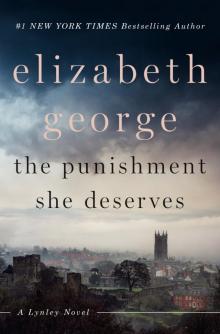 The Punishment She Deserves
The Punishment She Deserves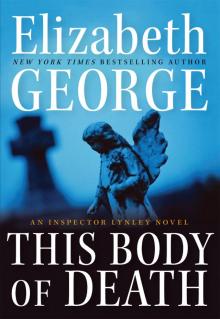 This Body of Death: An Inspector Lynley Novel
This Body of Death: An Inspector Lynley Novel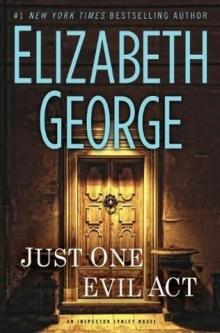 Just One Evil Act il-18
Just One Evil Act il-18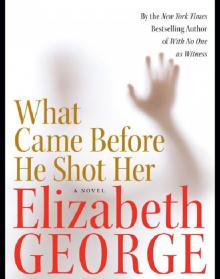 What Came Before He Shot Her
What Came Before He Shot Her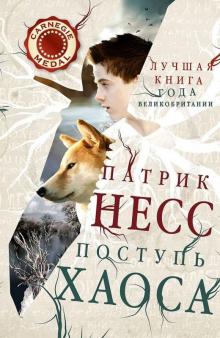 Missing Joseph il-6
Missing Joseph il-6